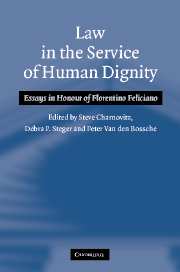Book contents
- Frontmatter
- Contents
- List of contributors
- Preface
- Biographical note
- List of abbreviations
- PART I Reflections on the contributions of Florentino Feliciano to international law
- PART II Insights into the World Trade Organization
- PART III The changing landscape of investment arbitration
- PART IV New challenges in international adjudication
- 21 From Preston to Prescott: globalizing legitimate expectation
- 22 The independence of the international judiciary: some introductory thoughts
- 23 ‘Straddling and highly migratory flags’ before the International Tribunal for the Law of the Sea
- 24 Collective security and the personalization of peace
- 25 Some thoughts on ‘Asian’ approaches to international dispute resolution
- 26 The Cameroon v. Nigeria; Equatorial Guinea Intervening (Land and Maritime Boundary) Judgment
- Bibliography of works by Florentino Feliciano
- Index
22 - The independence of the international judiciary: some introductory thoughts
from PART IV - New challenges in international adjudication
Published online by Cambridge University Press: 29 July 2009
- Frontmatter
- Contents
- List of contributors
- Preface
- Biographical note
- List of abbreviations
- PART I Reflections on the contributions of Florentino Feliciano to international law
- PART II Insights into the World Trade Organization
- PART III The changing landscape of investment arbitration
- PART IV New challenges in international adjudication
- 21 From Preston to Prescott: globalizing legitimate expectation
- 22 The independence of the international judiciary: some introductory thoughts
- 23 ‘Straddling and highly migratory flags’ before the International Tribunal for the Law of the Sea
- 24 Collective security and the personalization of peace
- 25 Some thoughts on ‘Asian’ approaches to international dispute resolution
- 26 The Cameroon v. Nigeria; Equatorial Guinea Intervening (Land and Maritime Boundary) Judgment
- Bibliography of works by Florentino Feliciano
- Index
Summary
Florentino Feliciano has contributed greatly to the development of international law as scholar, practitioner, judge, and arbitrator. He has a deserved reputation for excellence, independence, and integrity. Amongst his many contributions, I feel especially privileged to have benefited from his counsel and advice as a founding member of the Steering Committee of the Project on International Courts and Tribunals. He was amongst those who actively encouraged the Project to focus on the independence of the international judiciary. This is a subject that has attracted greater attention as international courts and tribunals increase in number and in influence.
The first efforts to establish a standing international court occurred in the 1890s; they foundered for the simple reason that the states involved in the diplomatic negotiation of the Hague Peace Conference of 1899 could not agree on the method of appointing the judges, in particular how to balance the competing interests of, on the one hand, the desire of every participating state to have a judge on the court with, on the other hand, the need for a tribunal of manageable proportions (imagine a national Supreme or Constitutional Court of fifty or more judges …).
The first international court – the Central American Court of Justice – was established in 1907, between a small enough number of states to dispose of the obstacle on which the Hague discussions foundered. At this court each participating state had a judge on the bench.
- Type
- Chapter
- Information
- Law in the Service of Human DignityEssays in Honour of Florentino Feliciano, pp. 313 - 322Publisher: Cambridge University PressPrint publication year: 2005
- 1
- Cited by



